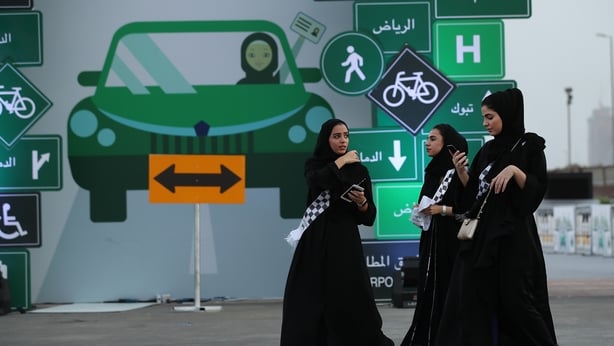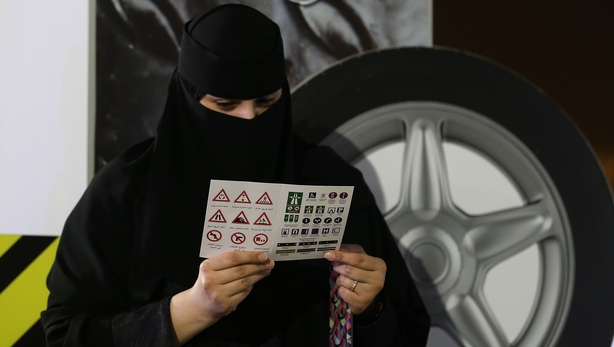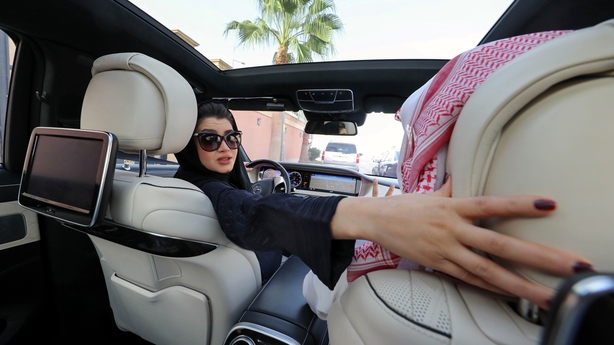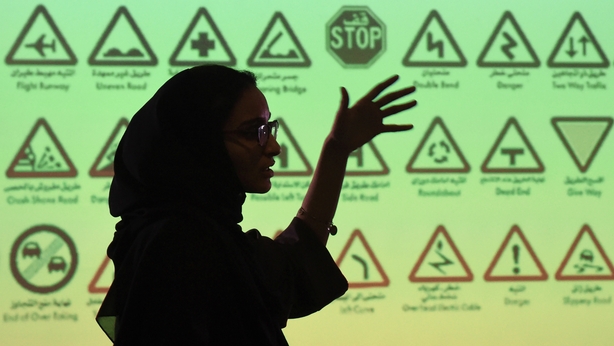Today, the world's only ban on women drivers will end. Women in Saudi Arabia will be allowed to sit behind the wheel and drive for the first time.
Up until now, they relied on male members of their family to drive them or were forced to hire private drivers. Many Saudi women spent most of their wages on drivers as a result.
But last September, King Salman decreed that the decades old policy would end. The first driving licences were issued earlier this month and the ban itself was formally lifted today.

Why was there a ban in the first place?
Saudi Arabia is a deeply conservative Muslim kingdom ruled according to Sharia law. Men and women are segregated from each other in public places. Alcohol and music are banned. Shops and restaurants close up to five times a day to facilitate prayer.
Under the guardianship system women cannot travel abroad, work or marry without the consent of a male guardian, usually their closest male relative.
In the past, it has been argued that women drivers were incompatible with Saudi culture. There were claims that removing the ban would lead to promiscuity and the breakdown of the family unit. One cleric even insisted that driving harmed women's ovaries.

Why the change?
The move has been linked to a far-reaching liberalisation campaign being driven by the Crown Prince Mohammed bin Salman, the King's 32-year-old son.
In 2015, women were allowed to vote and to run for seats on local councils. The powers of the religious police were curbed in 2016. They still patrol some public spaces, but no longer harass people for being on the streets during prayer time or enter private establishments to enforce gender segregation.
Unrelated men and women are increasingly allowed to enter family sections of restaurants together. Shops still close multiple times a day for prayer but some allow customers to stay inside and continue shopping.
Cinemas were reopened last month after nearly 40 years.
In April 2017 King Salman ordered that all government agencies should allow women to access government services without a male guardian's consent unless required by existing regulations.
However the guardianship system remains in place for decisions previously regulated for, including obtaining a passport for example, and outside of Government agencies,
for example, a private employer may look for a guardian's permission before hiring a woman.

Economic Factors
In 2016 Crown Prince Mohammed bin Salman announced 'Saudi Vision 2030'.
It proposes a radical reform of the Saudi economy and aims to diversify it away from its dependence on oil.
Part of this plan is to increase the number of women in the workforce, and it's thought that the driving ban would have made this more difficult to achieve.
Uptake
Forty-seven-year-old Clinical Psychologist Samira al-Ghamdi is among those who have already received a driving licence.
"I think it will change our life. We are ready, and it will totally change our life," she told Reuters.
The lifting of the ban is also creating opportunities for women to make money from driving.
The ride-hailing app Careem has pledged to have 20,000 female drivers operating in Saudi Arabia by 2020.
Enaam Gazi Al Aswad is Careem's first Saudi female driver.

"I have freedom now to drive any time I want to drive, with income!" she enthusiastically explained, "It will help me financially, it will help me socially, it will help me to feel alive again and to go out, drive and meet people."
However not all women will be in a position to obtain a driving licence. For some, the cost of the licence and lessons is proving prohibitive.
"Not everyone can afford it. It will take me two months to save up enough to pay for the licence fee," 20-year-old literature student Salwa al-Zahrat told Reuters, "and then it will take me three years to save up for a car."
With guardianship laws still in effect, women from more conservative families may still be barred from driving by their male guardians.
Arrests
A shadow has been cast over King Salman's reforms. Earlier this month, Saudi Arabia said it had detained 17 people for "undermining" the kingdom's security.
Human rights groups identified many of the detainees as women who had been campaigning for the right to drive, and to end the conservative Islamic country's male guardianship system.
Pro-government media outlets published photos of the detained activists and accused them of being traitors.
Authorities say eight of the detainees have been "temporarily released" until the investigation is completed.

Amnesty International has condemned the arrests.
"The recent crackdown has had an unsettling effect on the already dire situation of freedom of expression, association and assembly in the country. Activists have reported that people are afraid to speak out", said Samah Hadid, Amnesty International’s Middle East Campaigns Director.
"The smear campaign that targeted these activists is unprecedented, and proves that any views that do not align with the government’s reform agenda will not be publicly tolerated."
Future
The crackdown has raised doubts about the future of reform in the kingdom.
Activists say the next campaign would be to end guardianship laws. Under the guardianship system, women cannot travel abroad, work, marry or have medical procedures without the consent of a male guardian, usually their closest male relative.
Amnesty's Samah Hadid said: "The lifting of the ban is a long-overdue small step in the right direction, but must now be followed by reforms to end a whole range of discriminatory laws and practices. It is outrageous that women are still treated like second-class citizens in Saudi Arabia."







